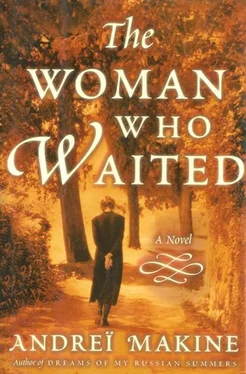The coach doors opened, the people went out into the snow-swept blackness, vanished into the shadow of long, dark brown brick walls.
As Leningrad drew nearer, the appearance of the passengers changed. Better dressed, younger, more talkative. Our contemporaries. The only person resembling those early travelers on the train was an old woman down in the subway looking lost, who quickly vanished at an intersection of the tunnels.
“You and I are going to get out,” said Arkady “To Boston or London. And in the end, you know, they’ll be making perfumed rubbers here, too. But the old men with their fingers missing will have gone. And so much the better for them. I’m off tomorrow. If you’ve got any masterpieces that need shipping to the West…”
I received three letters from him, roughly five years apart, all from Israel; then, nine years later, a postcard from New York. The first letter announced the birth of his daughter. The second told me the child was learning the piano. The third (but his handwriting had greatly changed) said the girl had been injured in a bomb attack and had lost three fingers from her left hand. Learning of this, I would be reminded of the machine-gunner reading Pravda . Such is the stupid way with coincidences, always timed to demonstrate the inhuman absurdity of man’s activities. I would also reflect on the monstrous mixture of happiness and heartbreak that must be experienced by parents when everyone regarded their child as having been spared.
The card from New York said: “If, fifteen years ago, I could have imagined what I’ve become today, I’d have hanged myself from the big pipe on the tank in the Wigwam shithouse. Do you remember that pipe where the rust had made a picture of Mephisto’s head on the wall?”
In my own case, what that trickle of rust used to remind me of was a sailing ship with an incredibly tall mast.
When he left me in the subway at Leningrad, Arkady also proposed this job to me, a commitment he could no longer fulfill because of his departure: to go into the Archangel region, and write a series of reports on local habits and customs. “In the provinces, you know, they always want a graduate from Moscow or Leningrad. It’s for their commemorative album. Some town anniversary or a folk festival. Whatever. You should go. Go and jot down a few fibs about the gnomes in their forests. But the main thing is, there’ll be lots of material for your anti-Soviet satire… I’ll be off at the crack of dawn. Don’t bother to come to the airport.”
In August of that same year, I found myself in the village of Mirnoe, a few steps away from a woman who had just hauled in a fishing net. A woman waiting for the man she loved.
THAT DAY I RAN INTO HER AGAIN in the same place as the first time, in the willow plantation at the edge of the lake. The branches had already lost their leaves, the red clay along the shoreline was all streaked with this muted gold. Dressed in her old cavalry greatcoat and shod in heavy boots, she was pushing a boat silted up among the columns of rushes. A vessel too broad and heavy for rowing, designed no doubt for sailing. But perhaps the only one left in these parts that was still able to float.
“Can I help you?”
She stood up, smiled at me distractedly, as if through a glass dulled by memories, acquiesced.
After a few heaves, our bodies keeping time with one another, the boat slid into the water, at once becoming light, dancing. I held onto the gunwale to let Vera step on board, climbed in after her, tried to take an oar.
“I’ll do it,” she said softly. “There’s too much wind. You need to know the ins and outs of it. Take her instead…”
Her? Laid across the planks of the seat in the stern, I saw a long bundle in a thick cocoon of homespun cloth. Its shape indicated no particular contents but nevertheless gave rise to an obscure anxiety. I picked it up, astonished at its weight, looked at Vera, who was already propelling the boat far from the shore, against the wind.
“It’s Anna,” she explained to me. “She died three days ago. You’d gone to the district capital…”
Anna, the old woman I had seen leaving the little izba bathhouse in Veras company at the beginning of September.
I settled down, balanced the dead woman’s body on my knees, clasping it clumsily, the way childless men do when someone hands them a baby.
The ultra-swift scudding of the clouds turned that day into a syncopated alternation of twilight and sunshine, springlike brilliance and autumnal relapse. When the sky grew leaden, I would become aware that I was hugging a corpse; then, amid the dazzle of the sunbeams, an irrational surge of hope would grip me: “No. What I hold in my arms is still of our world. Still inseparable from this sunlight, from the raw chill of the waves…”
Toward the center of the lake the swell became severe, the boat pitched, the foam began to whiten the exposed shoreline. I was clutching my burden tightly now, as I would have done with any other load. Vera pulled strongly on the oars, thrusting aside the gray water, which parted with the ponderousness of jelly. I watched this woman’s body leaning forward, then flinging itself backward with legs stretched, chest and stomach to the fore, in a powerful physical thrust. Beneath the coarse fabric of her greatcoat, I glimpsed the delicate lace collar of a white blouse… A wave struck the side with extra fury, and I was obliged to lift up the woman I held in my arms, hoist her close to my face, just as if, stricken with grief, I could not bear to be separated from a loved one.
It was during this crossing, which in the end lasted scarcely half an hour, that I began to have my first doubts about the real reason for my attachment to this northern village.
Within a few weeks I had realized that my quest for local customs and legends could just as well have been pursued in the libraries of Archangel. All the folklore of wedding and funeral rituals had long since been documented in books. Whereas on the spot, in these almost deserted villages, the memory of traditions was being lost, for want of any means of passing them on.
This forgetting of the past was all the more marked at Mirnoe, where the inhabitants were, so to speak, expatriates, elderly women driven from their homes by solitude, illness, the indifference of their families. Responding to my questions, they told touching tales of their own misfortunes. And of the war. For it was this that had erased all other legends from the popular memory To these elderly inhabitants of Mirnoe, it was becoming the one remaining myth, a vivid and personal one, and one in which the immortals, both good and evil, were their own husbands and sons, the Germans, the Russian soldiers, Stalin, Hitler. And more specifically, the soldier Vera was waiting for.
As in all newly created myths, the roles of gods and devils were not yet set in stone. The Germans, the subject of visceral, passionate hatred, suddenly put in an appearance in the person of a sad-faced cook named Kurt. Zoya, a tall old woman who had the features of an icon darkened with age, had come across him in an occupied village near Leningrad, where she lived during the war. This German secretly brought remnants of food to the children of the village… The place he had in local mythology was equal to that of a Hitler or a Zhukov.
In the end, I despaired of being able to record wedding choruses, songs in celebration of birth or death. The only ditty I heard on those old lips told of the departure of the local soldiers who had, it seemed, prevented the Nazi troops joining forces with Marshal Mannerheim’s Finnish army Thus the blockade of Leningrad had not become total. Provisions reached the besieged city via a corridor the men of this region had paved with their corpses. Were they all from this region? And Mirnoe? I doubted it. But when I looked at the old women of the village, I realized that this slim consolation was all they had left: the belief that, thanks to their husbands, brothers, or sons, Leningrad had not fallen.
Читать дальше












